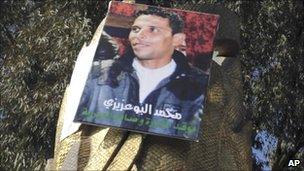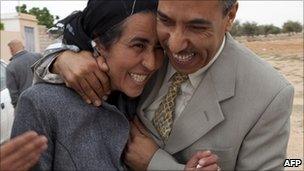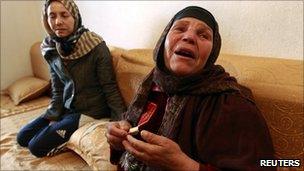Doubt over Tunisian 'martyr' who triggered revolution
- Published

Mohamed Bouazizi's face became a defining image of Tunisia's uprising
He was the perfect symbol for a perfect revolution.
Six months ago Mohamed Bouazizi set himself alight in front of the local government offices in the provincial Tunisian town of Sidi Bouzid.
Unjustly harassed and slapped across the face by a state official for trying to sell food from his market stall, so the story went, Mr Bouazizi had raged on social networking sites about the injustices of a corrupt regime and the lack of opportunities for Tunisian youth.
Weeks later, the young man died from his terrible burns and the rest is history.
But, just like the imperfections and flaws in Tunisia's subsequent "Jasmine" revolution, Mohamed Bouazizi's story is not quite the perfect metaphor that many have since written and talked about.
It seems that for some Tunisians, the 26-year-old martyr is no longer a political hero but a media creation, manufactured for the convenience of those - outsiders - who wax lyrical about the birth of the Arab Spring.
The official who "taunted" and "slapped" Mohamed is, arguably, almost as much a victim of Tunisia's former regime.
Fedia Hamdi was arrested and thrown into jail, days after Bouazizi's self-immolation, on the orders of President Zine el-Abidine Ben Ali - a 74-year-old dictator who saw his authority unravelling before his eyes but was powerless to prevent it.
Media-driven revolt
Many more would pay with their lives, before Ben Ali finally resigned and fled into exile in Saudi Arabia in mid-January, allegedly with more than a tonne of gold from the Tunisian Central Bank.
Ms Hamdi has since been released from jail and has been completely exonerated.

Fedia Hamdi was said to have beaten and humiliated Mr Bouazizi as he tried to sell his produce
While acknowledging there was indeed an argument between her and the young man she vehemently denies hitting him.
After four months in jail, the 46-year-old municipal inspector said she was only trying to move him along from trading in front of the municipal buildings, in contravention of local by-laws.
Ms Hamdi admits the incident sent Mr Bouazizi into a rage, but she has no idea why he then set himself on fire, or if he even intended to die in the act.
There is no doubt the subsequent popular uprisings in towns across the country were, in part, promulgated and promoted via social networking sites by driven, savvy young people.
But, again, our Mohamed Bouazizi was not the linked-in, internet whizz, you may have read about, who wrote online about his intentions and frustrations.
As it happens it was another college student, with the same name, who posted his poetry and revolutionary song lyrics on the web. It was arguably these posts and the way they spread like wildfire in Tunisia and beyond - which the regime could do nothing to stop - that helped fuel the uprising.
A recent investigation by the France 24 news channel found the other Mr Bouazizi alive and well.
'Cashing in'
There has also been a perhaps undeserved backlash against the family of the "original" Mohamed Bouazizi.
It has emerged his mother and stepfather accepted several thousand dollars in "compensation" from President Ben Ali, as he struggled to hang on to power.
The family has since moved from their modest home in Sidi Bouzid to a much bigger house in the upmarket Tunis suburb of La Marsa. Frustrated, even jealous, detractors accuse them of cashing in.
Lastly, while many towns and municipalities outside Tunisia, especially in France, have renamed streets and town squares after the martyr, Mohamed Bouazizi, where that has happened in Tunisia itself, the new signs are often defaced or torn-down, even in his native town of Sidi Bouzid.

Once considered national heroes, some have since turned on Mohamed Bouazizi's family
With an interim administration and constitutional elections scheduled for later this year, some worried Tunisians are already complaining that their revolution may be stolen from them.
Many in this, by Arab standards, liberal country fear the old elites and former members of the RCD ruling party will never fully relinquish power. Others warn that Islamist politicians, returning from exile, will take advantage of newfound political freedoms and try to impose conservative changes to what is a generally inclusive and tolerant constitution.
Many observers, myself included, believe that Tunisia is one country where the Arab revolution has a strong chance of succeeding.
Well-educated, European-influenced and ambitious citizens have already overcome huge obstacles to remove the vestiges of the past. For them there can be no going back.
Tunisia was an ideal place for the Arab Spring to begin.
Whether or not Mohamed Bouaziz's role in inspiring these revolutions has been exaggerated is a moot point, but history should not, perhaps, judge him too harshly.
We need our heroes, flawed or otherwise.
Across the Arab world, other reformists who took heart from events of the last six months and related to the frustrations of a young man from Sidi Bouzid will be looking to Tunisia for guidance and inspiration in the difficult months ahead.